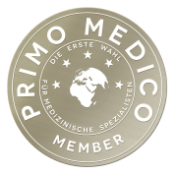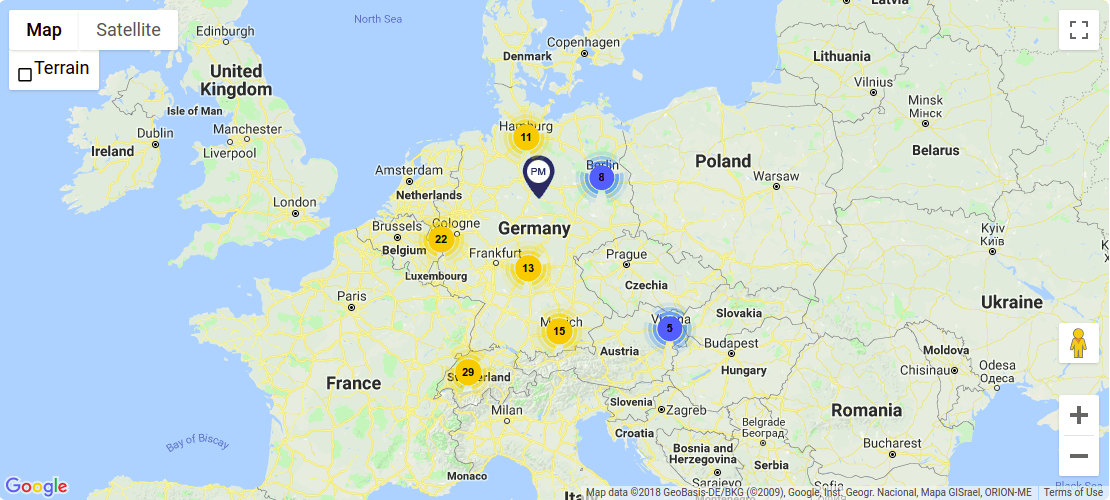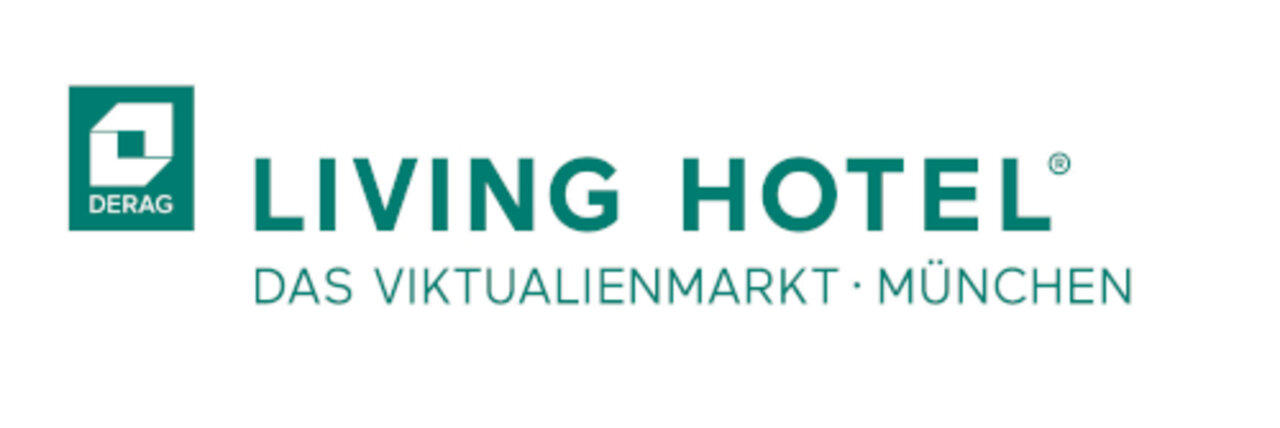European Radiosurgery Center Munich - The Specialists for Cyberknife & ZAP-X Radiosurgery
Treatment focus
- Benign brain tumors and metastases
- Spine and spinal cord diseases (metastases, benign and malignant tumors)
- Liver metastases and hepatocellular carcinoma (HCC)
- Prostate carcinomas and recurrences
- Bronchial carcinomas and lung metastases
- Renal cell carcinomas
- Uveal melanomas
Contact
Max-Lebsche-Platz 31, D-81377 München
P: +49 89 8967 4989 F: +49 89 4523 3616
Consultation Hours:
Monday - Friday 7:30 AM - 8:00 PM
Saturday, Sunday 9:00 AM - 6:00 PM

Medical Range
Range of Therapeutic Services
Brain Diseases
- Uveal melanomas (eye disease)
- Acoustic neuromas (vestibular schwannomas)
- Meningiomas
- Angiomas - arteriovenous malformations (AVM)
- Brain metastases
- Trigeminal neuralgia
Prostate Diseases
- Prostate carcinoma
- Prostate cancer recurrence
Spine/Spinal Cord Diseases
- Spinal Metastases
- Spinal neurinomas
- Spinal meningiomas
Lung Diseases
- Bronchial carcinomas
- Lung metastases
Liver Diseases
- Primary hepatocellular carcinoma
- Liver metastases
Lymph Nodes
- Lymph node metastases
Kidney Diseases
- Renal cell carcinoma
- Urothelial carcinoma
More Information
Card
Welcome to ERCM, the most advanced center for robot-guided radiosurgery in Germany. With us, affected patients receive optimal therapy for their indication. The decisive factor here is that we only carry out treatments in which our technologies enable above-average treatment success. Furthermore, treatments are carried out promptly and gently and benefit from our high-level networking.
As a pioneer in using Cyberknife and ZAP-X technology, we can particularly treat small and well-defined tumors. In addition, cyberknife treatments can be carried out in many parts of the body and are a long-proven alternative to surgery or several weeks of radiation therapy.
ERCM Munich: High-Precision Robot-Guided Tumor Therapy
The European Radiosurgery Center Munich has successfully treated patients with tumors and metastases since 2005. To date, more than 10,000 patients have been successfully treated in Munich. The systems used in Munich (Cyberknife M6 and ZAP-X) treat benign and malignant tumors with high precision and sub-millimeter accuracy using digital imaging and mobile robotics.
Tumor patients receive treatment of the highest safety and quality. In addition, radiosurgical therapy is available in Munich to patients covered by health insurance and private patients.
Tumors can be treated very well with Cyberknife and ZAP-X technology if the relatively strict indication criteria for radiosurgery are met. For example, tumors must not be too large and have clear borders. If this is the case, Cyberknife or ZAP-X treatment is often a much more convenient alternative to surgery or several weeks of radiation therapy.
State-of-the-Art Radiosurgery in Munich: Specialists in the Treatment of Tumors and Metastases.
Cyberknife technology combines high-performance robotics with digital imaging to track the tumor in the patient continuously. The radiation source is mounted on a robotic model, like those used in the automotive industry. The robot's arm has six degrees of freedom as it moves around the room. In addition, the patient is also positioned movably on a robot-guided couch. Thanks to this flexibility, tumors can be reached in all body parts.
The system can continuously locate the marked tumor during the entire radiation time and compares the data in real-time with the digital imaging data via two additional X-ray units. In this way, the robotic arm can always direct the beam precisely to the tumor, and any patient movements, such as breathing or vibrations, are automatically compensated.
ZAP-X Treatment
While Cyberknife technology can treat the entire body, ZAP-X technology is specifically designed for brain treatments.
This state-of-the-art technology exploits its gyroscopic range of motion to treat tumors in the head and neck region precisely.
This technical finesse means that tumors and metastases in the brain can be treated with particularly low risk. Specifically, acoustic neuromas, brain metastases, or complicated tumors of the meninges (meningiomas) are ideal indications for ZAP-X treatment.
CyberKnife for Prostate Cancer and Recurrences
As an alternative to surgery or conventional radiation, certain prostate cancers can be treated well using the Cyberknife method.
If a prostate carcinoma has a Gleason score of 6 or 7 (PSA up to 20 ng/ml) without infiltrating growth into the organ capsule, there may be an indication for treatment with CyberKnife.
Using the CyberKnife, the surrounding tissue can be spared to the maximum so that a regular function of the urinary bladder or rectum can be maintained. This can have a significant positive impact on the patient's quality of life after treatment.
Even in tumor recurrence after surgery or conventional radiation, CyberKnife can often be used as an adjuvant treatment.
Radiosurgery & Radiotherapy in Bavaria: Highest Expertise in the Treatment of Lung Cancer and Lung Metastases
Due to respiratory excursions, the lung tissue is constantly in motion. As a result, a primary tumor or metastasis in the chest also moves up and down, depending on breathing. Therefore, conventional radiation methods rely on tight chest immobilization or even involve anesthetizing the patient for better control of the respiratory cycle.
CyberKnife technology, on the other hand, adapts to the patient by sensing the patient's breathing movements via a three-dimensional camera so that the robotic arm's movements are synchronized with the patient's chest movements. Thanks to this respiratory compensation, targets in the lung tissue can be safely irradiated while sparing the respiratory tract.
Treatment of Liver Cancer and Metastases
Due to its location directly below the diaphragm, the liver is also breath dependent. Thanks to the breathing compensation technique described above, CyberKnife can deliver precisely targeted radiation to tumors or metastatic foci in liver tissue. To enable reliable target tracking, the tumor is marked with a gold probe under computed tomography monitoring before irradiation under local anesthesia. This treatment is also associated with a considerable increase in patient comfort and can be carried out in outpatient settings.
Renal Cell Carcinoma - Therapy of Renal Tumors at the Munich Center
At the European Radiosurgery Center in Munich, kidney tumors are treated using CyberKnife in close interdisciplinary cooperation with the urology department of the University Hospital in Großhadern, especially in patients who are not considered for surgery. Furthermore, since the kidneys are also displaceable due to respiratory movements, correcting this respiratory-dependent tumor movement is indispensable for safe and sufficient irradiation.
Interdisciplinary Expertise in Neurosurgery, Radiotherapy, and Proton Treatment
Our patients can rely on being treated only by internationally recognized radiosurgery experts - with a background of more than 25 years of experience and more than 1000 patients per year. As pioneers of radiosurgery in Germany, we are mainly distinguished by our interdisciplinary expertise in neurosurgery, radiotherapy, and proton treatment.
Please, visit the website of the European Radiosurgery Center Munich for more information.
Curriculum Vitae
Prof. Dr med. Alexander Muacevic
| 2021 | Opening of the ZAP-X Center in Munich Großhadern |
| 2013 | Nomination as Professor at the Ludwig-Maximilians-University Munich |
| 2006 | Habilitation at the Ludwig-Maximilians-University Munich |
| 2005 | Opening of the Cyberknife Center Munich with Prof. Berndt Wowra |
| 2005 | Completed Further Training as a Radiosurgeon |
| 2003 | Specialist in Neurosurgery, Neurosurgical Department, Großhadern Hospital |
| 1996 – 2003 | Internship, Assistant Physician Neurosurgery Department, Klinikum Großhadern, Ludwig-Maximilians-University Munich |
| 1995 | Doctorate with Prof. Dr A. Perneczky, Mainz |
| 1991 – 1995 | Stays Abroad in Los Angeles (USC), Charlottesville, Virginia, and London (Institute of Neurology and Neurosurgery) |
| 1990 | Scholarship from Boehringer Ingelheim KG, Department of Pharmacology, Ridgefield, Connecticut, USA (Dr Wegner) |
| 1989 – 1995 | Medical Studies at the Johannes Gutenberg University Mainz, Germany |
Dr med. Markus Kufeld
| Since 2018 | Dr Med. Markus Kufeld, Adds to the team of Physicians at the Cyberknife Center in Munich-Großhadern |
| 2011 – 2017 | Establishment and Management Function at the Charité CyberKnife Center, Charité - Universitätsmedizin Berlin, Under the Co-Directorship of Prof. Dr Med. Volker Budach, Director of the Department for Radiation Oncology and Radiotherapy, and Prof. Dr Med. Peter Vajkoczy, Director of the Department for Neurosurgery |
| December 2009 | Specialist Certificate in Radiation Protection "Teletherapy Limited to Stereotactic Irradiation of the Head and Body with Gamma Knife and CyberKnife." |
| 2007 – 2010 | Collaboration at the European Cyberknife Center Munich-Großhadern (Prof. Dr Med. B. Wowra, Prof. Dr Med. A. Muacevic) |
| 2006 – June 2007 | Specialist, Operative Activity in the Department for Neurosurgery, Charité - Universitätsmedizin Berlin, Campus Virchow Klinikum (Prof. Dr Med. Dr h.c. M. Brock, from April 2007: Prof. Dr Med. P. Vajkoczy) |
| May 2007 | Additional Qualification in Medical Informatics |
| 2005 – 2007 | Postgraduate Studies at the Technische Fachhochschule Berlin in the Master's Program "Medical Informatics" with Graduation as Master of Science, Medical Informatics (M.Sc.) 2008 |
| 2000 – 2005 | Assistant in Advanced Training and Scientific Assistant in the Department for Neurosurgery, Charité - Universitätsmedizin Berlin, Campus Virchow Klinikum (Prof. Dr Med. W.R. Lanksch, from October 2003: Prof. Dr Med. Dr h.c. M. Brock) |
| June 1999 | Doctorate with Attaining a Doctorate from the Medical Faculty of the Georg-August-University Göttingen |
| 1998 – 2000 | Internship in the Department of Neurosurgery, University of Erlangen (Prof. Dr Med. R. Fahlbusch) |
| 1998 | Medical Exam (Third State Exam) |
| 1992 – 1998 | Study of Human Medicine at the Georg-August-University Göttingen |
Dr med. (Dott Univ. Bari) Antonio Santacroce
| Since 2022 | Dr Med. Antonio Santacroce Add to the Team of Physicians at ERCM in München-Großhadern |
| 2021 | Specialist in Neurosurgery |
| 2017 | Doctorate with Acquisition of the Doctorate of the Medical Faculty of the Heinrich-Heine-University Düsseldorf |
| March 2015 | Specialist in Radiotherapy Acquisition of Specialist Certificate in Radiation Protection in the Entire Field of Radiation Treatment (Teletherapy and Brachytherapy) |
| 2009 – 2021 | Assistant Physician in Advanced Training and Research Associate Department of Radiotherapy and Radiation Oncology (Prof. W. Budach) Department of Neurosurgery University Hospital Düsseldorf (Prof. H.J. Steiger) Department of Neurosurgery University Hospital Tübingen (Prof. M. Tatagiba) Department of Neurosurgery St Barbara Klinik Hamm (PD Dr C. Ewelt) |
| July 2009 | Approbation as a physician - Bezirksregierung Düsseldorf |
| 2007 – 2009 | Research Fellowship ( Scholarship) under the Supervision of the European Gamma Knife Society (ELGKS) in Cooperation with the Department of Neurosurgery of the Heinrich-Heine-University Düsseldorf: "Gamma-Knife Radiosurgery for Intracranial Meningiomas |
| 2007 | Intensive German Language Training |
| 2006 | Internship in the Department of Pediatric Neurosurgery at the Catholic University of Rome, Italy (Prof. Concezio Di Rocco) |
| February 2006 | License to practice medicine "Ordine dei medici e chirurghi della Provincia di Bari", Italy |
| 1999 – 2005 | Studies of Human Medicine at the Universita' degli Studi di Bari - Italy |
Team
- Prof. Dr Alexander Muacevic
Radiosurgeon, Neurosurgeon - Dr Markus Kufeld
Radiosurgeon, Neurosurgeon - Dr Antonio Santacroce
Radiosurgeon, Neurosurgeon - Priv. Doz. Dr Annabel Graser
Urologist – Specialty Urooncology - Dr Michael Fedorov
Attending physician
Transport Connections
| Munich Main Station | 9km |
| Munich Airport | 51km |
Medical Articles
European Radiosurgery Center Munich - Tour
European Radiosurgery Center Munich - Tour
Information about Munich
Bavaria's capital is the third largest city in Germany and is located far to the south in the foothills of the Bavarian Alps. The proximity to the Alps makes Munich a location for winter and hiking sports, but there are many lakes and royal castles in the surrounding area, providing the city with other attractive leisure destinations. Located to the left and right of the mountain river, the Isar, the city itself offers quite a few opportunities for recreation in the interior. In the center, the old town, founded in 1158, is marked by the former city gates.























